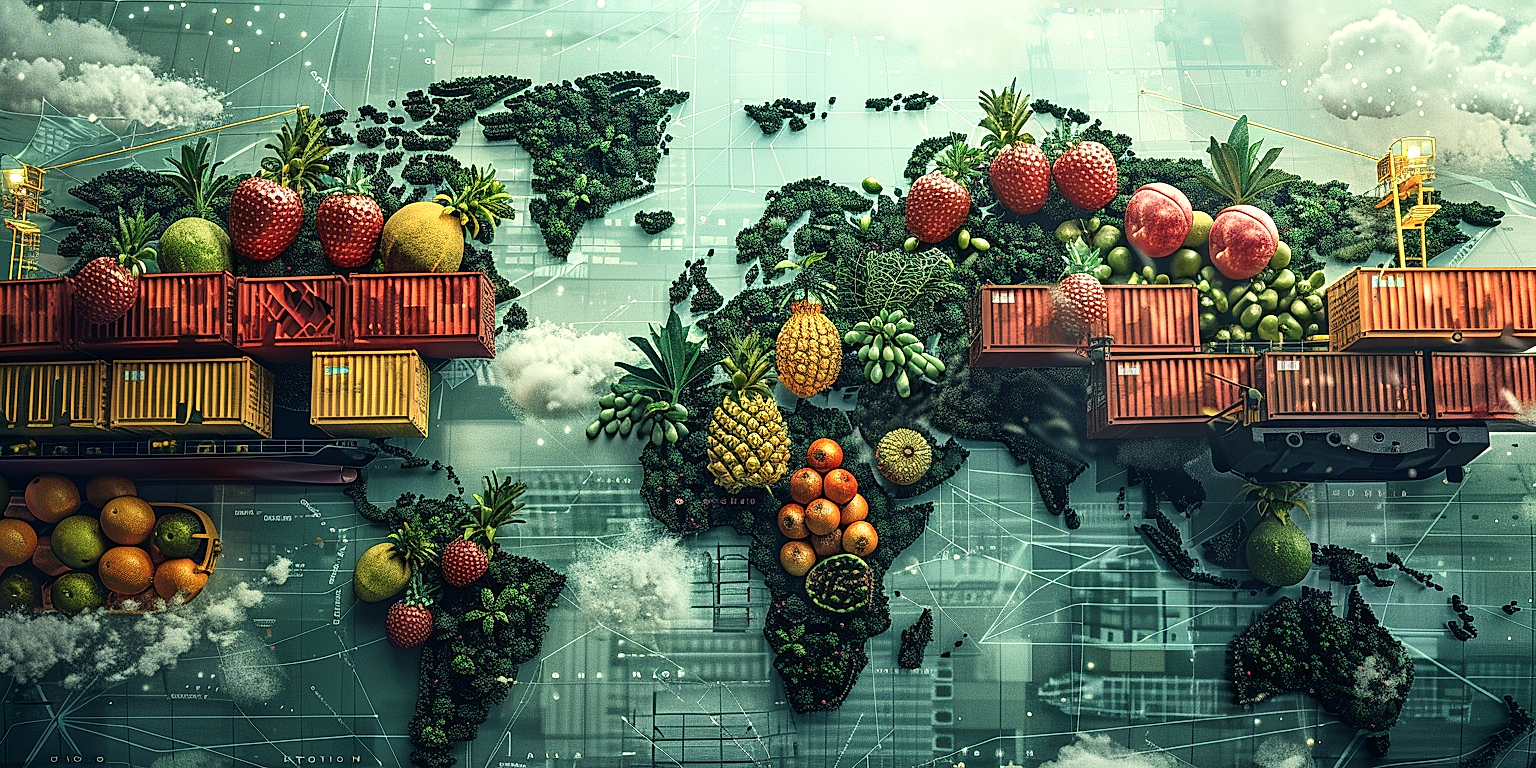In the realm of international commerce, produce shipping holds a distinct market niche.
The coordination of transferring fresh goods across borders demands well-crafted strategies.
This ensures the quality of the commodities while maintaining strict adherence to guidelines set by different countries.
However, navigating these waters is often a challenging endeavor, fraught with many complexities from various legal, logistical, and financial angles.
Truly, it takes more than basic business acumen to successfully engage in this kind of trade.
An understanding of specific strategies is central in addressing these intricacies effectively; thereby, overcoming the challenges and exploiting the opportunities that lie in the international arena.
Contents
- Strategies For Navigating International Trade In Produce Shipping
- 1. Strengthen Relationships with Overseas Suppliers
- 2. Understand all countries’ import/export regulations.
- 3. Implement an effective inventory management system
- 4. Consider currency exchange rate fluctuations.
- 5. Invest in Quality Packaging for Produce
- 6. Ensure Proper Licenses for International Trade
- 7. Keep abreast of global trade developments.
- The Bottom Line
1. Strengthen Relationships with Overseas Suppliers
Navigating international trade in produce shipping requires a deep understanding of various aspects, one of which is strengthening relationships with overseas suppliers.
This component plays a fundamental role in ensuring stability and the consistent delivery of quality produce to different markets across the globe.
Without good and strong relationships with your suppliers, even the most carefully planned logistics and business development strategies may encounter unexpected hurdles.
These relationships are a backbone of your international trade activity, acting as a lifeline that sustains your business and helps it to thrive.
Suppliers are not simply transactional entities; they are strategic partners who can greatly contribute to the success of your produce shipping business.
Building a strong relationship with these partners should be a strategic initiative that aligns with your business’s objectives and growth plans.
Improving communication with your suppliers is an essential step towards building a stronger partnership.
Allowing for open and transparent communication can prevent misunderstandings and build trust, which in turn improves overall cooperation and efficiency.
Establishing long-term contracts with suppliers can also be a beneficial strategy as this provides an element of business security for both parties involved.
It can ensure a steady supply of produce and reinforce the commitment between you and your supplier.
Visiting your overseas suppliers can also be a powerful tool for strengthening relationships.
Face-to-face visits can create a personal connection, and afford you a deeper understanding of your supplier’s operations and processes.
This understanding can then translate to mutually beneficial changes that improve the efficiency or quality of the produce supplied.
Another key strategy for strengthening relationships with overseas suppliers is understanding and respecting cultural differences.
Negotiation styles, business formalities, and communication norms can vary greatly between countries, and acknowledging these differences can enrich the relationship and ensure smoother interactions.
Finally, investing in relationships with your suppliers by offering support in business development or training can demonstrate your commitment to the partnership and encourage growth on both sides.
In the realm of international trade in produce shipping, any enhancement in the supplier’s abilities or skills can consequently boost your own business’s prospects and potential.
2. Understand all countries’ import/export regulations.
When participating in international trade, especially in the produce shipping industry, gaining a deep understanding of the import/export regulations of all countries involved becomes extremely important.
These different countries might have varying legal requirements, taxation policies, and quality standards in place, which might rule the whole process of shipping produce.
The differences in these regulations could pose serious risks and challenges to your business if not properly understood and adhered to.
Every country has its list of prohibited and restricted goods, and fresh produce may fall in different categories depending on the nations’ laws.
Some countries impose even stricter rules on the import of fruits, vegetables, and other perishables to protect their agriculture from foreign pests and diseases.
Therefore, arming yourself with knowledge of all countries’ import/export regulations can protect you from potential legal implications, uncalled penalties, and unexpected losses.
The best approach to achieving this can be by contacting trade commissioners, using professional legal services, and engaging with experienced import/export agents in each country.
Familiar yourself with important regulatory authorities like the Food Safety and Inspection Service (FSIS) in the US or the Department for Environment, Food and Rural Affairs (DEFRA) in the UK, can also be extremely helpful.
Moreover, you may also need to understand special requirements for certain types of produce.
For example, the fruits that can evoke an allergic reaction can have distinct packaging and labelling requirements.
Understanding these rules is not only important to avoid penalties but also to build trust with your customers by ensuring that all goods are safe and comply with the highest standards.
You need to stay up-to-date with these regulations as they can change often due to various factors like political changes, trade agreements, or public health concerns.
Subscribing to updates from relevant trade authorities and organizations can be a good strategy to keep track of such changes.
Finally, understanding all countries’ import/export regulations will not only ensure smooth operations but also help you make informed business decisions like selecting suppliers, managing inventories, setting prices, and choosing shipping methods.
Thus, this step is not only about avoiding trouble; it’s also about finding opportunities.
3. Implement an effective inventory management system
In the world of international produce shipping, having an effective inventory management system is key.
Keeping track of your inventory can significantly reduce errors associated with lost, misplaced or surplus stock.
Moreover, when you streamline the inventory process, your operation gains the agility to swiftly adjust to market changes.
In an international context, an effective inventory management system can also help you anticipate and prepare for potential customs delays or regulatory issues.
The information gleaned from such a system helps to make strategic decisions like the best time to restock, which products move quicker, and what to prioritize during peak seasons.
Equally important is integrating technology into your inventory system.
Modern inventory management software can automate many of the functions associated with stock control, thus saving time and minimizing human error.
Real-time tracking of produce can help you monitor shelf life, thus reducing food waste and maximizing profit.
Additionally, a robust inventory management system organizes and analyzes data on sales trends, customer preferences, and seasonal demand variations across different markets.
With this information in hand, it becomes easier to forecast future demand and adjust inventory levels efficiently and effectively.
Furthermore, a sound inventory management system can facilitate the strategizing around logistics, storage, and distribution to minimize costs.
Implementing such a system involves training your workforce to understand and use it; this can be seen as an investment that will yield returns in efficiency and accuracy.
Moreover, it’s important to regularly revisit and tweak your inventory management system so as to adapt to the shifting business environment or emerging market trends.
Finally, while building your inventory management system always remember to factor in contingencies – unpredictable events such as natural disasters and political disruptions can drastically impact supply and demand.
In the long run, investing time, resources, and energy on implementing an effective inventory management system in your international produce shipping business will drive strategic growth and success.
4. Consider currency exchange rate fluctuations.
As an integral part of international trade, currency exchange rate fluctuations can significantly impact the profitability of your produce shipping business.
Greengrocers and shippers dealing in international markets must therefore keep an eye on exchange rates to avoid unexpected losses.
Not only are the costs of goods and services affected, but so is the value of business transactions that take place across currencies.
When the exchange rate fluctuates, it can alter the original price agreed upon in a sales contract, thus affecting the profit margins.
Moreover, if not well calculated, these fluctuations can also affect the pricing strategy of a business.
For instance, if you peg the price of your goods to a certain currency, say the US dollar, and it weakens against the currency of your target market, your goods may turn out to be more expensive than local products.
Therefore, keeping abreast of changes in the forex market and devising strategies to mitigate their impact is crucial for survival in international trade.
There are several online resources, news sites, and financial platforms that provide real-time updates on currency exchange rates and allow you to track them.
Using this information, businesses can analyze how currency fluctuations might influence their operational costs and pricing strategy.
This knowledge can guide decision making in terms of when to buy or sell currency for international transactions.
There are also numerous financial products available, such as forward contracts and forex futures, that allow businesses to hedge against potential losses due to currency fluctuations.
These tools essentially allow businesses to lock in a future exchange rate, providing certain protection against currency volatility.
However, businesses must be aware that while hedging can protect against loss, it can also prevent benefitting from favorable rate changes.
Furthermore, one must have a solid understanding of these financial products or seek the advice of a qualified financial advisor before using them.
Finally, businesses can also choose to invoice in their home currency to avoid the risk of currency fluctuation altogether, but this may not always be feasible or desirable from the customer’s perspective.
5. Invest in Quality Packaging for Produce
When expanding your produce shipping operations to the global market, one of the most crucial aspects to consider is investing in quality packaging.
This is not just about maintaining the aesthetics of your product but more importantly, preserving the freshness and quality of the produce during its journey to international markets.
It’s important to understand that the journey for overseas shipment is typically longer than domestic transportation, which expose your goods to more risks such as temperature fluctuations, humidity, and physical damages.
Therefore, investing in robust packaging solutions isn’t an optional expense but a requisite that directly affects the profitability of your international trade.
Several packaging technologies have been innovated to enhance the shelf life of fresh produce during lengthy transportation.
For instance, controlled atmosphere packaging (CAP) which modifies the atmosphere within the packaging to slow down the ripening process and maintain the freshness of the produce.
Ethylene absorbers and emitters, moisture absorbers, odor absorbers, and other active packaging solutions can also be used to prolong the freshness and quality of your produce.
Sustainable packaging materials such as biodegradable plastics, plant-based packaging, and compostable materials have also become popular for their environment-friendly features which can help you appeal to the growing number of environmentally conscious consumers.
Moreover, choosing the right packaging also entails understanding the requirements of your target market.
Some countries have specific regulations about the type of packaging that can be used for food products, and ignorance to these rules can lead to heavy fines or even shipment rejection at the customs.
It is also important to note that improving packaging is not a one-time effort but a continuous process of innovations and improvements.
With evolving technologies, consumer shifts, changing regulations, and the unpredictable challenges in the global trade sphere, the packaging for your produce must continually evolve to stay ahead of the curve.
Remember, the quality of your produce as received by the consumers has a significant impact on their purchasing decisions in the future.
So, by investing in quality packaging, you will not only be able to reduce spoilage and ensure the safe arrival of your produce but also build your brand’s reputation for quality, ultimately driving your success in international trade.
6. Ensure Proper Licenses for International Trade
Stepping into the sphere of international trade requires adherence to a set of legal parameters, and obtaining the necessary licenses is the first major step towards ensuring this compliance.
To begin with, it’s vital to understand that different countries have their own specific trade licenses requirements and prerequisites for dealing in produce shipping.
Consequently, embarking on international trade while lacking the necessary licenses can lead to severe legal ramifications, which may include monetary fines, confiscation of goods, or even an outright ban on conducting trade in that particular country.
The role of ensuring the proper licenses for international trade must not be underplayed as it forms the core foundation for establishing the legality and credibility of your international produce shipping operations.
Various agencies across different countries issue these licensing documents. In the U.S., for example, it’s the Bureau of Industry and Security that deals with issuing such licenses.
Thus, understanding and familiarizing oneself with the respective authority in the trading countries can go a long way in seamlessly navigating the licensing process.
As part of the licensing process, entrepreneurs might need to undergo a detailed scrutiny process that involves investigating their trading history, credit standing and other relevant financial metrics.
This process is vital as it ensures that only qualified and credible participants are allowed into the international produce shipping arena.
In some cases, businesses might also need to secure additional permits and licenses for specific agricultural products. For instance, certain countries mandate additional permits for shipping genetically modified organisms or organic produce.
Therefore, it is essential to understand the specific prerequisites of the products being shipped to avoid any legal complications downstream.
Furthermore, securing the necessary licenses is not a one-time process. In fact, several licenses need to be renewed periodically to ensure their validity for continued trade operations.
Moreover, because licensing requirements and procedures can undergo changes, it’s crucial for businesses to stay updated about these developments to remain compliant with the current trade regulations.
All this reflects the reality that obtaining and maintaining appropriate licenses is an indispensable part of navigating international trade in produce shipping.
In light of the importance and complexity of these processes, it’s advisable for businesses to enlist the assistance of professional trade compliance experts. These experts can provide beneficial guidance on the intricacies of international trade laws and ensure that all necessary measures are taken to secure appropriate licenses.
7. Keep abreast of global trade developments.
As the world continually evolves, it is crucial for companies involved in international trade to keep informed of global trends and developments.
This is all the more important in the produce shipping industry, where changes in global trade policies can directly impact costs and operations.
Recognizing the importance of staying updated on global trade evolutions can significantly influence an organization’s ability to navigate the complexities of international trade proficiently.
Trade developments are greatly driven by various factors, such as the economic health of countries, geopolitical circumstances, and even global health crises like the COVID-19 pandemic.
Changes in these areas can lead to alterations in import and export regulations, new trade agreements, or changes in existing ones.
An effective strategy is to have a dedicated team or individual tasked with monitoring global trade developments.
This team or individual should be responsible for looking into relevant news, participating in industry forums and interactions, as well as attending trade-related events and seminars.
They should also foster connections with trade experts, learning from their insights, knowledge, and advice.
Such a proactive approach is crucial in ensuring a timely response to any changes that could affect the company’s trading activities.
Furthermore, the use of advanced technology-based solutions can greatly aid in keeping updated on global trade developments.
These might include subscription to trade-alert services, use of international trade databases, or even AI-driven prediction tools.
Such tools can help anticipate trade changes and prepare the business for any potential effect on operations.
Moreover, constant learning should be encouraged within the organization to ensure that all involved understand the depth and complexity of the world trade system.
This would involve regular training sessions, workshops, or webinars that focus on international trade, thereby building a well-informed team capable of navigating the ever-evolving realm of global trade.
While it can be a challenging task to keep up-to-date with global trade developments, it is a vital strategy for any company involved in international trade, especially in produce shipping where the impact of these changes can be significant.
The Bottom Line
Amplifying relationships with foreign suppliers and grasping international import and export regulatory practices, are pivotal to enhancing global trade efficacy.
Implementing a robust inventory management system is also an important measure to maintain proactive control of goods.
It’s also essential to be attentive to currency exchange rate fluctuations, as they can significantly affect overall profitability.
Furthermore, investing in high-quality packaging is paramount to ensure the products reach international customers in optimum condition.
Securing proper trade licenses will ensure trade activities remain within legal boundaries, and staying informed of global trade trends will help in strategic decision making.
These steps combined will unquestionably fortify and streamline a business’s international trade operations.




